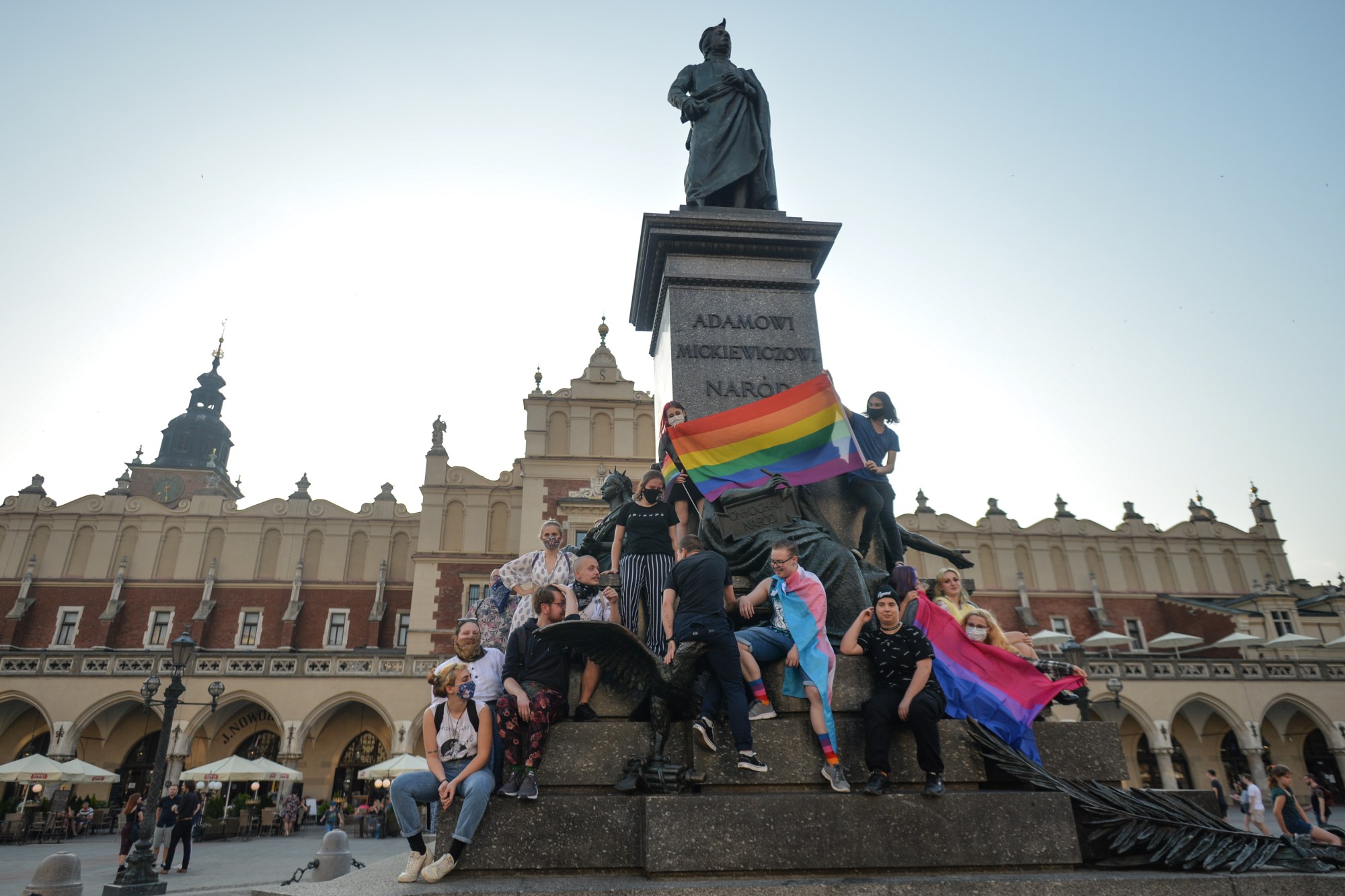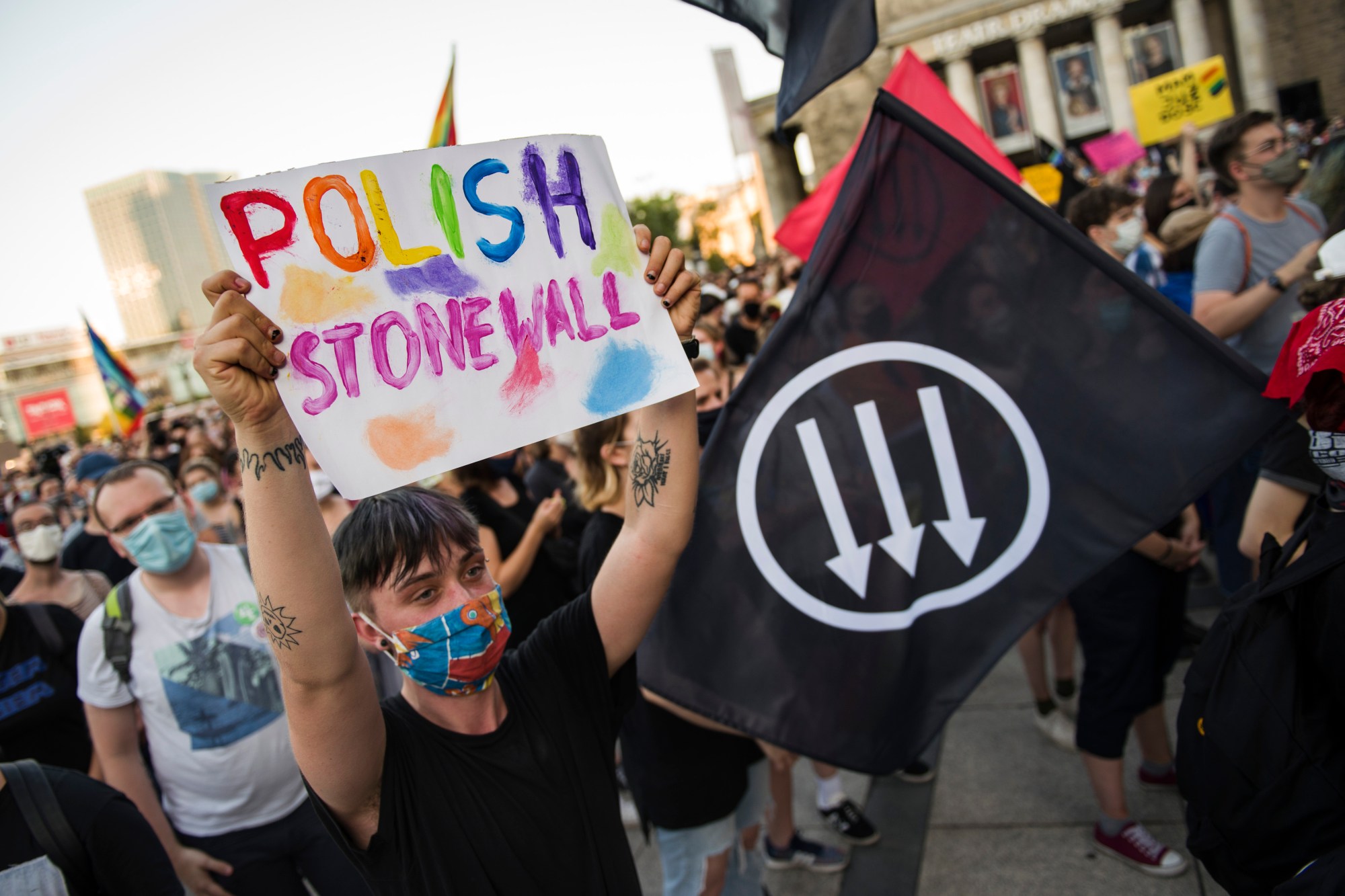On Friday, August 7th in Warsaw, Avtomat – a queer party promoter, DJ and activist – was one of several protestors defending a statue draped in a rainbow flag. “I was trying to ensure nothing happened to it, because I knew it was a powerful symbol for people passing by,” he explains. Furious homophobes brandished lighters, spat at them and attempted to seize the flag, but activists held on until the angry bystanders were replaced by a steady wave of queer teenagers. “It was heartbreaking to see the disbelief in their eyes,” he recalls. “They were like, ‘Oh my god, this is my symbol, and it’s in a public place.’ It never happens.”
These flags were displays of solidarity with Margot Szutowicz, co-founder of queer collective ‘Stop Bzdurom’ [‘Stop Bullshit’]. In mid-July, she was arrested for “allegedly causing damage to a truck promoting false anti-LGBT propaganda and assaulting a pro-life demonstrator on June 27th”, and then allowed to walk free. When Avtomat was guarding the statue, she was being violently seized by police just metres away. 48 protestors were arrested that day, and their brutal treatment has become the catalyst for an ongoing wave of activism being described as the ‘Polish Stonewall’.

According to Mathias Wasik, the Director of Programs at international LGBTQ+ NGO All Out, this “brutal crackdown is the tip of the iceberg.” For a while, it seemed public perceptions of queer people in Poland were shifting. This progress was cut short last year, when right-wing party PiS (Law & Justice) launched a ruthless smear campaign which ultimately helped them to win a second term in office. Perception shifted almost overnight: queer communities were first written off as havens for dangerous pedophiles, and then further erased when around 100 municipalities declared themselves ‘LGBT-free zones.’ Now, ministers are comparing them to Nazis. “They’ve been practically declared enemies of the state,” Mathias concludes.
Avtomat and the arrested protestors saw this hostility firsthand: they were bundled roughly into police vans, driven recklessly around the city with no information and no seatbelts (a fear-mongering tactic, he explains) and laughed at by officers, who threw in homophobic slurs for good measure. “That’s classic Poland,” he sighs. Their basic human rights – to access vital meds in detention, to call their lawyers for advice – were denied, and the few politicians who tried to help were lied to by officers. “They came to the detention centre I was in,” he says, “but they were told I wasn’t there.
Solidarity marches have cropped up from Hungary to New York (there’s one planned in London this Saturday), but those unable to attend have flooded their online accounts with information, bail funds and calls for help. Last weekend, amidst other marches, there was another standoff in Warsaw: queer activists were counter-protested by Polish nationalists, who burned a rainbow flag. Avtomat tells me he again saw activists arrested for blocking the aforementioned trucks baring homophobic propaganda.
“Social media has been crucial,” says Twitter user @qyuiqq has been one of many to include #PolishStonewall in his bio to raise awareness of this discrimination. “I probably wouldn’t know half of what I do without people posting photos and live-streams, plus TV stations and newspapers aren’t that good at reporting the protests. They constantly misgender the activists.”
A combination of state-sanctioned hatred, proposed criminalisation (President Andrzej Duda has said he’s considering a Polish equivalent to Russia’s ‘gay propaganda bill’) and a global pandemic have also made grassroots queer collectives more vital than ever. When Avtomat was detained, the news spread like wildfire through the pages of Oramics and Ciężki Brokat, both of which he’s a member, and Stop Bullshit has used its network to raise more than €18,000 to support activists.
Elsewhere, talented young artists have channeled their frustrations into powerful imagery. @XKumah posted a beautiful statement of resilience which racked up thousands of retweets, but, ultimately, behind that strength lies pain.
“Living as a queer person in Poland is like walking on a minefield,” they write via email, recalling their fear upon seeing the far-right attacks at last year’s Bialystok Pride. “Even if we were aware that our country wouldn’t eventually protect us, that attack still shocked the whole community. I believe that what’s happening now — these protests and petitions — carry the frustration we’ve been keeping in since Bialystok.”
The people we speak to echo the sentiment of strength in numbers, underlining the importance of queer community and solidarity across borders. “The Polish LGBTQ+ community is fighting back,” says Mathias, “and it’s stronger and bolder than ever.” He points to support from opposition politicians — some of whom co-ordinated their outfits to form a rainbow of support — and calls for tangible allyship from international allies, including EU member states, who he says should “urge the Polish government to respect the principles of tolerance and non-discrimination Poland committed to.” You can help, too, by signing petitions (All Out has racked up more than 300,000 signatures), continuing to demonstrate outside Polish embassies and amplifying the voices of activists on the ground.
When asked whether he’s optimistic about this wave of global support, Avtomat hesitates. “To be honest, I kind of don’t know. I’m thrown by this whole thing, and the magnitude of hate towards the LGBT community really terrifies me.” In his eyes, this cultural hatred combines with an authoritarian government to spell disaster for the foreseeable future. Yet despite exhaustion, his voice brightens when speaking about the strength of his community. “When you have those like-minded people, it makes you believe you have more power than you actually do… you don’t feel so helpless, you know? That’s why I’m an advocate for collectivity — we’re pretty much alone in this country. It’s becoming a dark world for queer people, so we need to stick together.”



